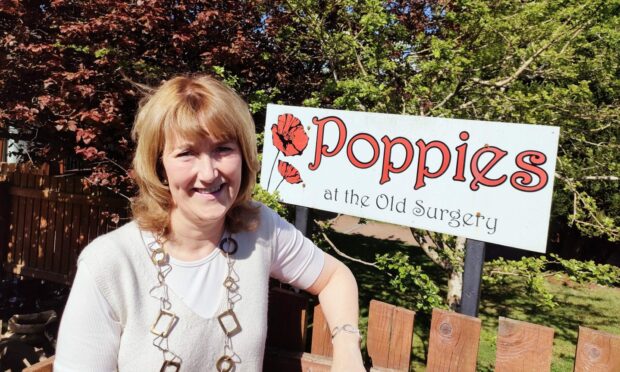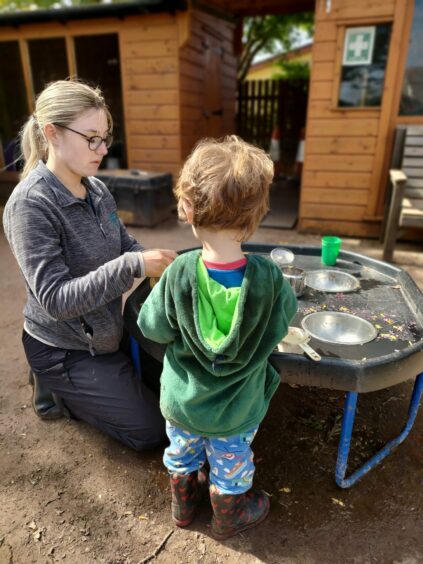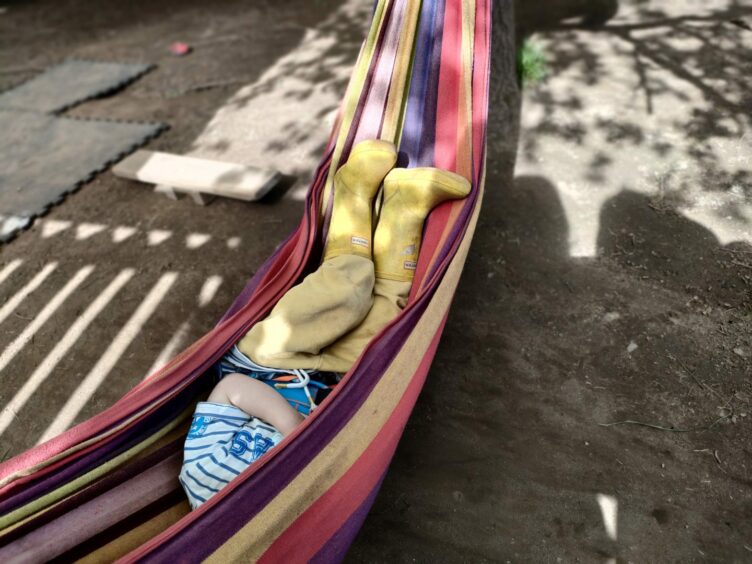At Poppies nursery in Laurencekirk, the children lead the adults. The result? A maximum grading of ‘Excellent’ in all categories by inspectors.
It is the third time since 2011 that the pre-school has received top marks by the Care Inspectorate.
So what makes it so special?
Poppies, which opened in 2007, is a Froebelian nursery.
Friedrich Froebel (1782-1852) was the inventor of the kindergarten, opening the first one in 1837.
Froebelianism puts particular focus on unity, autonomy and creativity, as well as the central importance of play. It also emphasises engaging with nature.
‘They’ll be up trees, they’ll be tending to hens…’ the Laurencekirk nursery isn’t driven by targets or routines
Froebel was a pioneer of early childhood education, and his ideas were considered revolutionary at the time.
But as a ‘delighted’ Poppies manager Sharon Imray told the P&J, they have been a key factor in their success.
“It has a definite impact. It works best for our children and our families.
“We’re very much outdoors, using nature, slow pedagogy. Our day is not driven by targets or routines, our day just flows.
“The Froebelian approach means that we work very holistically, we’re not target-driven in any fashion.
“Our children work in a free-flow way. They can choose to play indoors or outdoors in the garden. We work with them and where their interest lies.
“We’re also seasonally driven, so at the moment the children have all chosen to be outside and they’re all doing lots of different things.
“There’ll be children up trees, there’ll be children tending to our hens. Some will be reading a book, some will be having their snack, painting, it’s all happening in our garden.”
‘The minute the inspectors came in the door, they understood what we were about’
Froebelianism has various elements, and there is no one thing that makes Poppies so successful, says Sharon.
“It’s a whole range of different things. If you came to visit us and you came through our door, you would feel it. You feel the essence of what we’re doing.
“There’s a huge amount of commitment — that’s number one. We’re all committed to doing the very best for the children that we can.
“I think relationships are key. As a team we’ve got very good relationships with each other and we’ve got very good relationships with our parents, children and wider community. I think we’ve had that since day one.
“The minute the inspectors came in the door, they understood what we were about. We don’t change anything because the inspectors are coming in. We just work in the way we always do.
“Everybody has nerves on inspection day, but the staff are proud of their work and were happy to share what they do with the inspectors.”
‘The day is absolutely and fully driven by the children’
It’s fair to say Poppies takes a flexible approach to learning. While Sharon and her staff are there to guide the kids, it’s the children themselves who lead them, not the other way around.
Indeed, the inspection report noted that children were involved in the recruitment process for new staff.
“I can look outside and I can see adults sitting alongside children, others not sitting near children but observing them, just respecting all the time the children’s right to be where they are.
“We don’t rush them off to nappy time. Nappies do need to be changed and we need to do that for comfort. But we’re respectful in the way that we do it. We don’t do it in a ‘you must get that done by 10 o’clock and you must all come at this time’ way.
“With routines, we’re much more flexible to the rights of the child to help us flow slowly through the day.
“The day is absolutely and fully driven by the children.
“Froebelians work with something called ‘freedom with guidance’. So we’re alongside you. We’ll make sure you’re safe, but we know when to step back.
“We have rules, but in a supportive way rather than a rigid way. The four and five-year-olds are able to share the rules with those who are younger.
“And everyone works as a team and supports each other.”
‘Huge responsibility’ as one of country’s top nurseries
One thing that the Care Inspectorate report repeatedly referred to was the staff’s constant striving after improvement.
Something Sharon thinks is vital for Poppies, given their hard-earned status as one of the best nurseries in the country.
“I think when you’re sector-leading you’ve got a huge responsibility.
“You’ve got to not just maintain this, but be continually looking for growth.
“So it’s really special for us that we’re still there and moving forward.”





Conversation